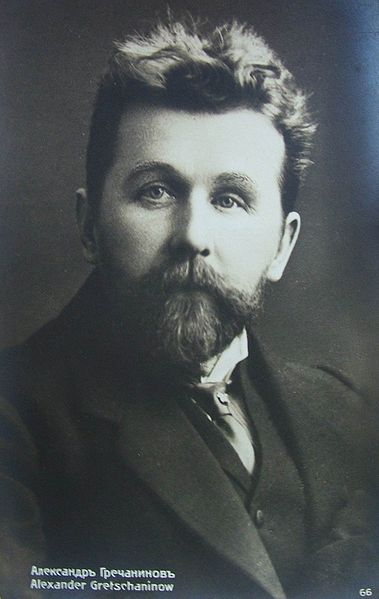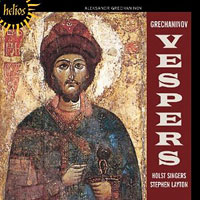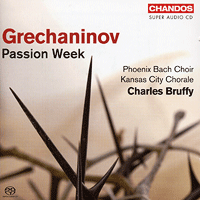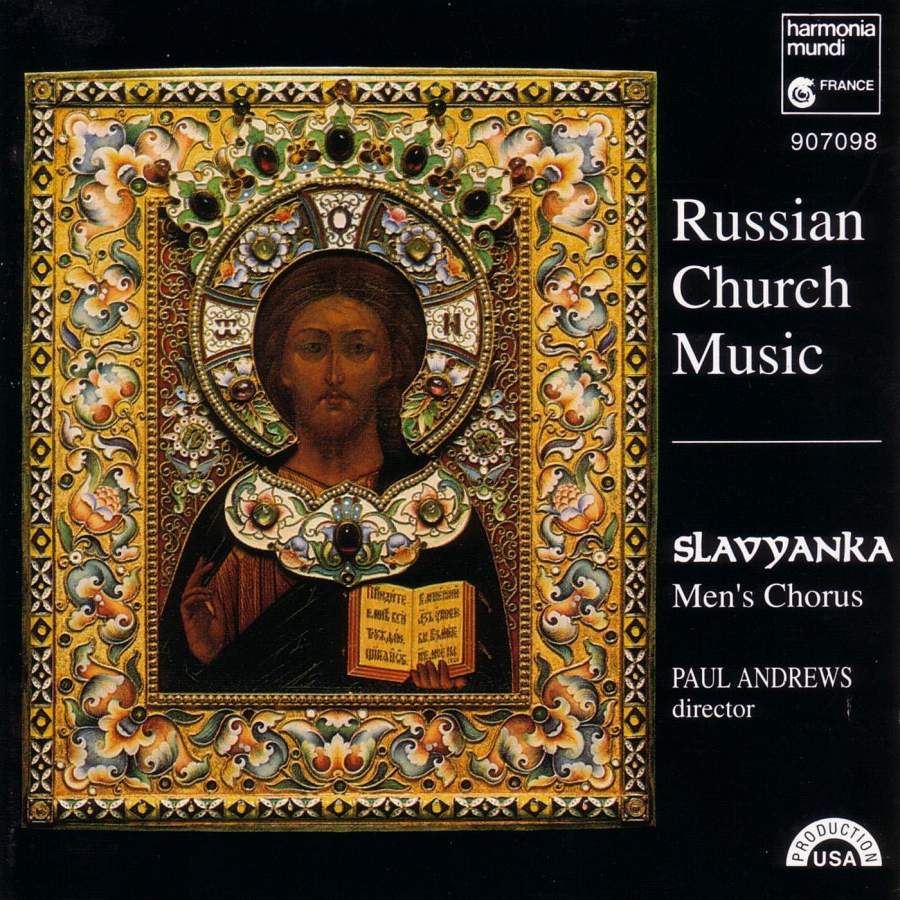In Celebration of the Human Voice - The Essential Musical Instrument
Home | Doo Wop | Barbershop | World | Contemporary | Christian | Vocal Jazz | Choral | Christmas | Instructional | Arrangements
Classical | Opera | Musicals | Personality | Young Singers | Disney | Videos | Songs | The Artists

Alexander Gretchaninov

Gretchaninov started his musical studies rather late because his father, a businessman, had expected the boy to take over the family firm. Gretchaninov himself related that he did not see a piano until he was 14 and began his studies at the Moscow Conservatory in 1881 against his father's wishes and without his knowledge. His main teachers there were Sergei Taneyev and Anton Arensky. In the late 1880s, after a quarrel with Arensky, he moved to St. Petersburg where he studied composition and orchestration with Nikolai Rimsky-Korsakov until 1893. Rimsky-Korsakov immediately recognized Gretchaninov's extraordinary musical imagination and talent and gave him much extra time as well as considerable financial help. This allowed the young man, whose parents were not supporting him, to survive. Out of this came an important friendship, which only ended in 1908 with Rimsky's death. As such, it is not surprising that Rimsky's influence can be heard in Gretchaninov's early works, such as his String Quartet No.1, a prize-winning composition. Around 1896, Gretchaninov returned to Moscow and was involved with writing for the theater, the opera, and the Russian Orthodox Church. His works, especially those for voice, achieved considerable success within Russia, while his instrumental works enjoyed even wider acclaim. By 1910, he was considered a composer of such distinction that the Tsar awarded him an annual pension. |
Arrangements | Recordings
Recordings and DVDs
Displaying 1-3 of 3 items.
Holst Singers : Vespers - Grechaninov Grechaninov was initially taught by Anton Arensky in Moscow, and then later, in 1890, he went to St Petersburg to study with Rimsky-Korsakov. It was he who influenced his style and helped him launch his professional career. After the Revolution, Grechaninov became increasingly uneasy in Soviet Russia, and in 1925 left for ever. In 1946 he took American citizenship. An unusually versatile and prolific composer, he wrote operas, symphonies, chamber music, over 250 songs, and a great deal of music for children. He has been described as the most representative composer of his generation writing for the Orthodox service. Vespers is part of the All-Night Vigil service, and Grechaninov's setting was composed, premiered, and published in 1912. This precedes Rachmaninov's setting by three years. It appears to have lain dormant for some eighty years until it was revived in America for its first performance of modern times in 1995. Songlist: Now the Powers of Heaven, In Thy Kingdom, Lord, now Lettest Now Thy Servant, All Night Vigil Phoenix Bach Choir / Kansas City Chorale : Grechaninov - Passion Week The Grechaninov 'Passion Week' is a setting of thirteen pieces with texts in Church Slavonic meant to be sung individually over the period of Passion Week, the days leading up to the crucifixion and resurrection of Christ. The Russian Orthodox Church has a tradition of morning and evening services during Passion Week when the passion week's events are recalled almost in 'real time.' The music itself is generally slow, meditative, largely monophonic and almost trance-like. One notices that the usual number of singers in these two choirs has been supplemented by several additional basses, no surprise considering the long legato lines required of that section. Their low C's and even B's resound like the tolling of great bells throughout the work. One could almost surmise, if one didn't know, that this was the singing of a Russian choir, so noted for their deep basses, except that the blending and rounding of the choral tone is so very much more subtle than is generally heard from Russian choruses. The work is entirely a cappella and there are occasional soprano, tenor and baritone solos which consist mostly of chants sung against the main body of massed sound. Songlist: Behold, the Bridegroom, I see Thy bridal chamber, In Thy Kingdom, Gladsome Light, Let my prayer be set forth, Now the powers of heaven, At Thy mystical supper, The wise thief, Thou who clothest Thyself, The Lord is God... The noble Joseph, Weep not for me, O Mother, As many of you... Arise, O God, Let all mortal flesh Slavyanka : Russian Church Music This acclaimed men's chorus are excellent on this collection of some of the great a cappella pieces from the Russian Church. Songlist: Otche nash (Our Father), Blazhen muzh (Blessed is the Man, Sye nynye blagoslovitye Gospoda (Behold, Bless the Lord), Spasi, Gospoddi, lyudi Tvoya (O Lord, Save Thy People), Plotiyu usnuv (Having Fallen Asleep), Na ryekakh vavilonskikh (By the Rivers of Babylon), Voskliknitye Gospodyevi (Make a Joyful Noise), Glasom moim (With my Voice), Milost' mira (For the Mercy of Peace), Spasyeniyi sodyelal (Salvation is Created), Svyetye tikhii (O Gladsome Light), Dostoin yest' (Is Is Fitting), Pryeidye syen' (The Shadow of the Las Passed Away), Nynye otpushchayeshi (Lord, Now Lettest Thou They Servant Depart) , Milost' mira (For the Mercy of Peace), Otche nash (Our Father), Slava v vyshnikh (Glory to God in the HIghest) |
![]() Vocal Harmony Arrangements - Home
Vocal Harmony Arrangements - Home
Christian | Gospel | Standards | Musicals | Specialty | World | Barbershop | Contemporary | Vocal Jazz | Choral | Christmas
Mixed Voices | Female | Male | 8 Parts | 6 Parts | 5 Parts | 3 Parts | 2 Parts | Medleys | Solo | Folio Series | New Releases
Select a Category |
Want to Sing? - Find a Chorus Near You
List of Choruses by State | List of Choruses by City



